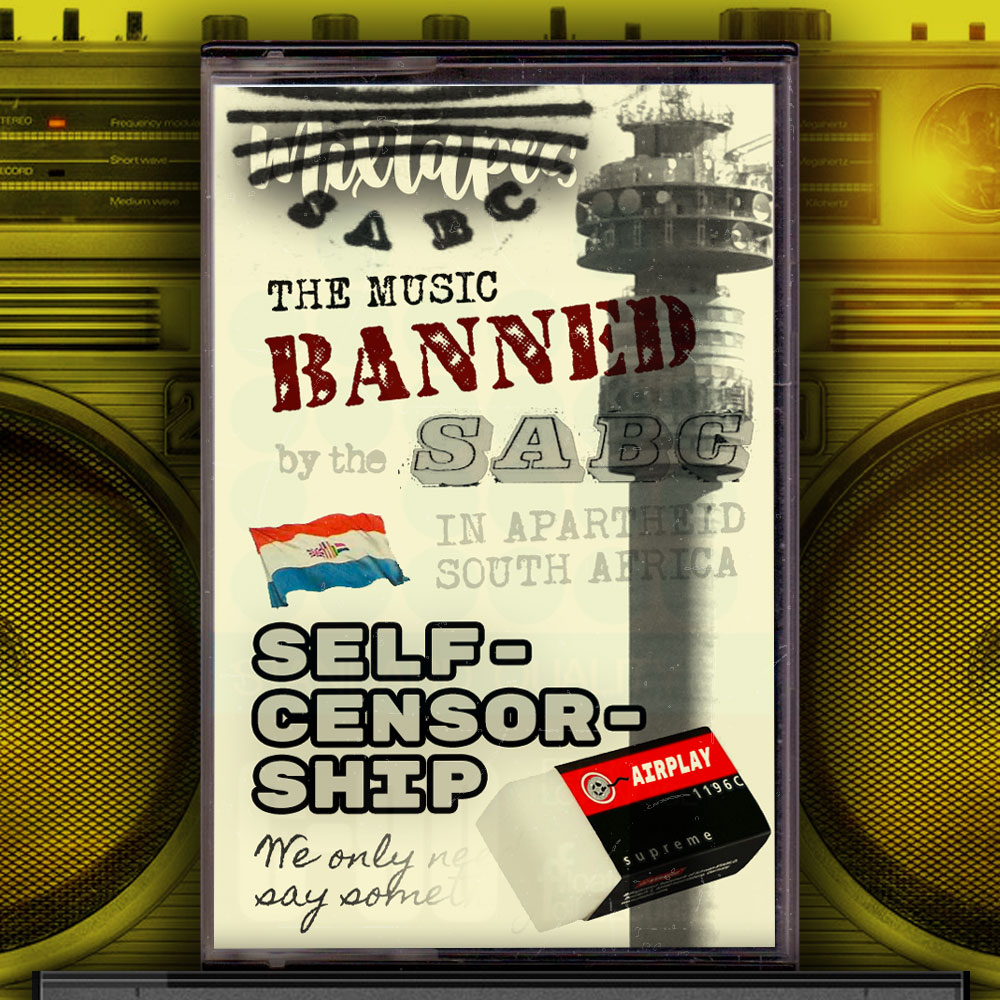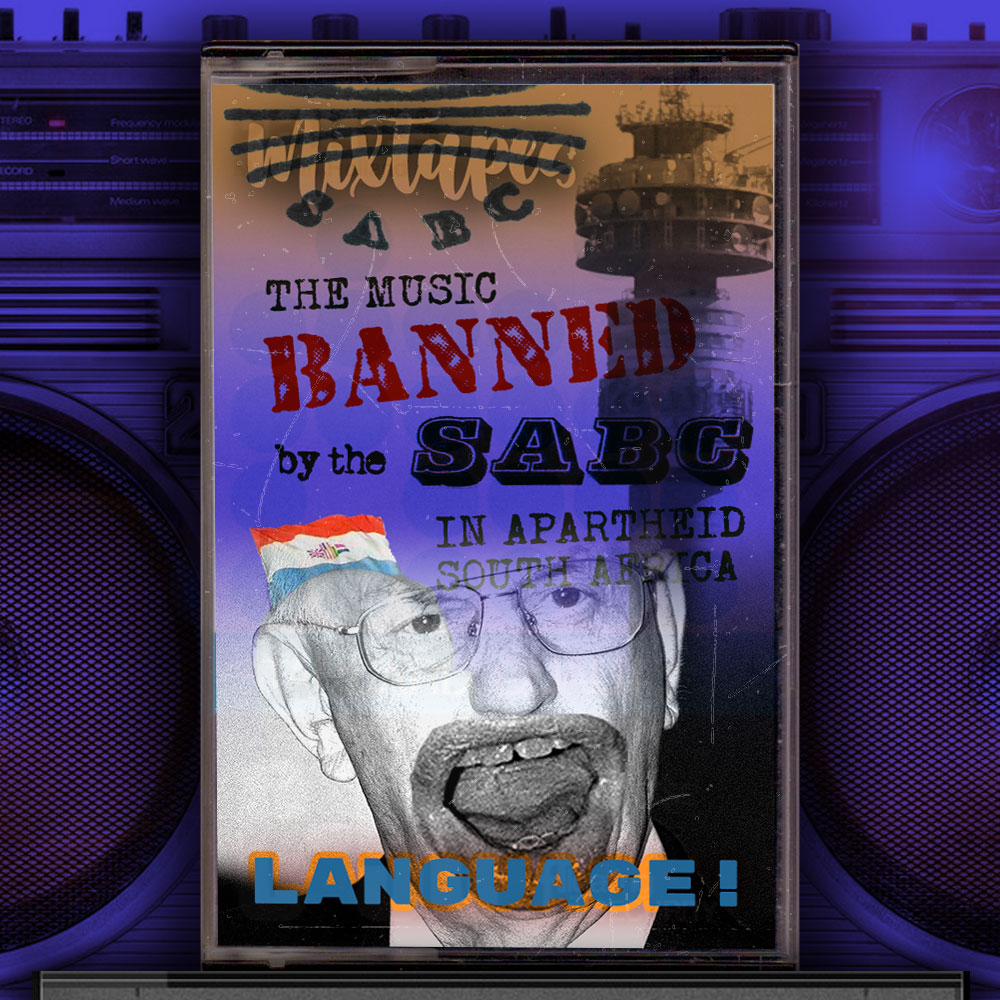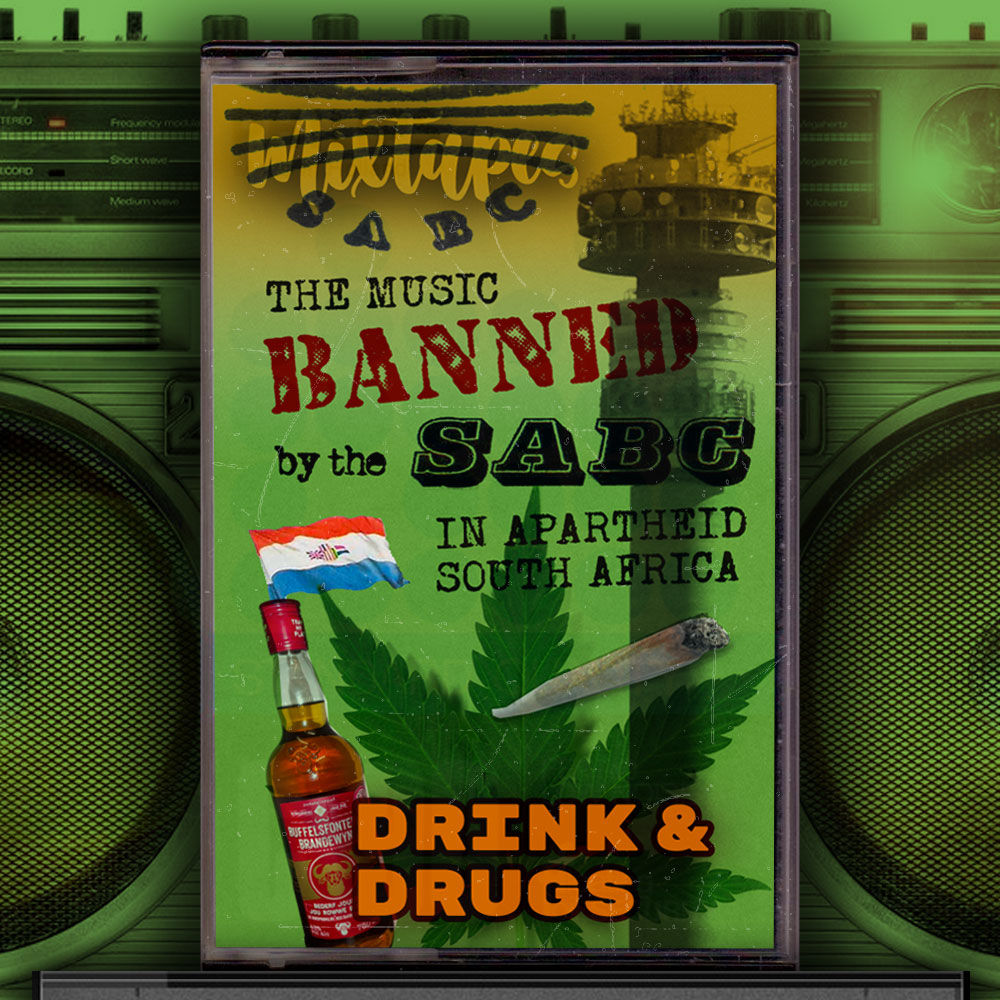
So far the censorship series has explored how the apartheid state’s Directorate of Publications and South African Broadcasting Corporation censored music in South Africa. This mixtape considers how state censorship in turn placed pressure on record companies and artists to regulate music in the form of self-censorship.
Immense pressure was placed on record companies to ensure that albums weren’t controversial. Failure to do so was likely to result in music either being banned outright by the Directorate and/or not receiving airplay on the SABC and independent radio stations. The buying public would be unlikely to hear the music, almost definitely resulting in financial loss for the record companies. As a consequence of the maze of formal censorship to be negotiated, record companies (especially the majors) were cautious about what they would record and, in turn, placed pressure on musicians to tone down their lyrics if they wanted their music recorded and released.
All the examples on this mixtape are of self-censorship in advance of government or SABC intervention. So we won’t be including instances such as songs left off an album after the album was banned by the Directorate of Publications in a censored re-release of the album, such as happened with Peter Tosh’s Equal Rights album after it was banned because of the song “Apartheid”. CBS then re-released the album without the banned track.
This mixtape begins with a bizarre example of self-censorship, where the South African distributor, Atlantic Recording Corporation, decided that the line “fuck a star” from the Rolling Stones’ chorus for “Star Star” (itself a censored title on the original UK release) could likely lead the album to be banned by the Directorate of Publications. As a compromise they decided to obscure the word ‘fuck’ by adding a drumbeat every time ‘fuck’ was uttered. The result was bizarre , as you can hear. Likewise, when the record company wanted to release Don Gibson’s Sensual Woman album they were concerned that the Directorate of Publications would ban the album because of the word ‘sensual’ (this was the early 1970s after all). They got Gibson to re-record the title track replacing ‘sensual woman’ with ‘beautiful woman’ and they also changed the album title accordingly.
In the case of Roger Lucey’s debut album, The Road is Much Longer, 3rd Ear Music received legal advice to the effect that, in terms of security legislation, some of the statements on the album could lead to long-term prison sentences and/or heavy fines for both Roger Lucey and Dave Marks of 3rd Ear Music. As a result two versions of the album were released. One of two omissions on the commercial release of the album was a verse of “You Only Need Say Nothing”:
There’s teargas at the funeral
Of a boy gunned down by cops
They say there’s too many mourners
And this is where it stops
Then they bring on the boots and the batons
And the blood runs fear and cold
And the moral of the story
Is to do what you are told
In several instances a song was simply omitted from an album in order to avoid possible censorship. In the mid-1960s Louis Armstrong’s “You are woman, I am man” was left off the South African release of his Hello Dolly album, presumably because of the line “You are woman, I am man. Let’s kiss”. For good measure, the first South African pressing also removed Louis Armstrong’s photograph from the album cover, presumably to hide the fact that he was black. This would have been more for sales than censorship reasons, London Records being afraid that (musically ignorant) racist whites would not buy the album if they knew the singer was black.
Jose Feliciano begins his 1969 Alive O album, with a short guitar rendition of “God Save the Queen” which was omitted from the South African release. Teal Record Company was clearly concerned that the British national anthem would irk the South African authorities, just years after the country’s departure from the British Commonwealth. In the 1980s EMI omitted “Burden of Shame” from UB40’s Signing Off album. The song criticized Britain’s supportive role of the apartheid government. In further examples, the songs “Tribute to Steve Biko” by Tapper Zukie and “South African Enlistment” by the Abyssinians were left off the South African releases of the Frontline II and Frontline III reggae compilations respectively. Both song expressed anti-apartheid attitudes. And “Mandela” was one of two songs which Mountain Records omitted from Aaron Davis’ Neon Bible album.
Anticipating problems at the SABC over Mi-Sex’s name, CBS released the group’s “Computer Games” single under the name ‘M.S.’ However, given that the Directorate was unlikely to ban an album on the basis of Mi-Sex’s name, the album Graffiti Crimes was released under the band’s full name. Culture Club’s “The Church of the Poison Mind” was released as a single entitled “Poison Mind” out of concern that the SABC censors would view the original title as blasphemous. When Santana’s Freedom album was released in South Africa the instrumental song “Mandela” was changed to “Mandel” to avoid using the name of South Africa’s most famous political prisoner.
Several South African musicians experienced record company pressure to censor their albums. For example, Neil Solomon, whose debut album The Occupant was released by WEA, changed the song “Strangler” to “Stranger” to improve the song’s chances of radio play. Juluka recorded their first album, Universal Men, in 1979, a few months before Zimbabwe’s independence. When recording the song “Sky People”, the line “The drums of Zimbabwe speak” was changed it to ‘The drums of Zambezi speak’ for fear that the reference to changes in Zimbabwe rolling into South Africa was too overt.
Rabbitt recorded a cover version of Jethro Tull’s “Locomotive Breath” for airplay, and changed the line “got him by the balls” to “got him by the horns”. Another Jo’burg Records band, the Radio Rats, were persuaded to change their song “Fucking About in the Dungeons All Day” to “Mucking About in the Dungeons All Day” in order to avoid censorship. Freedom’s Children were persuaded to change the name of the song “The Kid He Came From Nazareth” to the absurd “The Kid He Came From Hazareth” because Parlophone feared censorial repercussions for blasphemous reasons.
Some musicians avoided overt political references by writing symbolically about South African politics. One of the most famous examples was a play on wording by Chicco (Sello Twala) on his single “We miss you Manelow”, a slightly disguised reference to Nelson Mandela which was understood by many listeners.
Joseph Shabalala claimed to have written symbolic songs about the South African political situation. For example, Ladysmith Black Mambazo’s 1973 song “Nomathemba”, a song about a girl who Shabalala described as a symbol of hope. Shabalala said he was actually referring to South Africa though: that people should not lose hope and come together.
Equally cryptic was Steve Kekana’s song “The Bushman” about a hunter-gatherer who taught himself to shoot with a bow and arrow:
He lives under a tree
Hides himself and sleeps
His mind is tuned to be aware of danger
He never makes mistakes
Survival is his way
At nights he plays a song an a wooden kalimba
Wo ho the bushman
He fights like a man should do
He strives like a man should do…
These sentiments complied with apartheid notions of blacks as primitive and the song was played on SABC. However, Kekana explained that he wasn’t referring to a real “bushman” but rather to ANC guerrillas.
Nevertheless, the more cryptic the symbolism was, the less likely listeners were to realize there was anything resistant about the song at all, in which case, in terms of political sentiments, the song might as well have been left off the album altogether. The most troublesome aspect of formal censorship then, is the way censors’ actions begin to mess with artists’ creativity, so that they begin to police their own output. When this happens, censors have realized their ultimate goal.
- Star Star – Rolling Stones
- Mucking Around The Dungeons – Radio Rats
- Locomotive Breath – Rabbitt
- The Kid He Came From Hazareth – Freedom’s Children
- The Stranger – Neill Solomon
- Sky People – Juluka
- South African Enlistment – The Abyssinians
- Tribute To Steve Biko – Taper Zukie
- Burden Of Shame – UB40
- The Bushman – Steve Kekana
- We Miss You Manelow – Chicco
- Church Of The Poison Mind – Culture Club
- Computer Games – Mi Sex
- Mandela – Santana
- Mandela – Aaron Davis
- You Are Woman, I Am Man – Louis Armstrong
- Nomathemba – Ladysmith Black Mambazo
- You Only Need Say Nothing – Roger Lucey
- Beautiful Woman – Don Gibson
- God Save The Queen – Jose Feliciano



